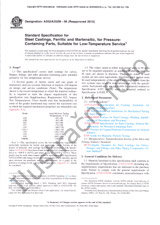Potřebujeme váš souhlas k využití jednotlivých dat, aby se vám mimo jiné mohly ukazovat informace týkající se vašich zájmů. Souhlas udělíte kliknutím na tlačítko „OK“.
ASTM D1292-15(2021)e1
Standard Test Method for Odor in Water (Includes all amendments and changes 12/6/2021).
Přeložit název
NORMA vydána dne 1.11.2021
Informace o normě:
Označení normy: ASTM D1292-15(2021)e1
Datum vydání normy: 1.11.2021
Kód zboží: NS-1043973
Počet stran: 8
Přibližná hmotnost: 24 g (0.05 liber)
Země: Americká technická norma
Kategorie: Technické normy ASTM
Kategorie - podobné normy:
Anotace textu normy ASTM D1292-15(2021)e1 :
Keywords:
odor, odor intensity, odor threshold, water,, ICS Number Code 13.060.50 (Examination of water for chemical substances)
Doplňující informace
| Significance and Use | ||||||||||
|
5.1?The odor of water is a subjective property which is recognized as having a significant effect on its quality. This test is intended to provide a reproducible test method for determining the intensity of odor in waters for comparative or control purposes. 5.2?The test may be useful in checking the quality of raw or treated waters, determining the effectiveness of treatment procedures, or in tracing sources of contamination or leaks in industrial processes. 5.3?The results of the test are very dependent upon the observers, since the sensitivity of individuals to odor is highly variable and changes from day to day. Careful standardization of the conditions is essential. |
||||||||||
| 1. Scope | ||||||||||
|
1.1?This test method 1.2?Effluents may carry a myriad of compounds, difficult to measure individually, which contribute to odor problems. Combinations of compounds can cause an odor intensity or develop a characteristic that cannot be anticipated from odors of the individual substances. 1.3?Because of the variation in human sensitivity, high precision in determining odor intensity is not possible. There will not always be agreement on odor characteristics by various testers. Odor analysis provides the tool to measure variation in odor intensity at a given sampling point. The degree of variation may indicate the magnitude or importance of an odor problem. Determining the cause of the variation or the source of the objectionable characteristic may define the odor problem better than analysis for individual compounds. 1.4?The values stated in SI or inch-pound units are to be regarded as the standard. The values given in parentheses are for information only. 1.5?This standard does not purport to address all of the safety concerns, if any, associated with its use. It is the responsibility of the user of this standard to establish appropriate safety, health, and environmental practices and determine the applicability of regulatory limitations prior to use. 1.6?This international standard was developed in accordance with internationally recognized principles on standardization established in the Decision on Principles for the Development of International Standards, Guides and Recommendations issued by the World Trade Organization Technical Barriers to Trade (TBT) Committee. |
||||||||||
| 2. Referenced Documents | ||||||||||
|
Doporučujeme:
Aktualizace technických norem
Chcete mít jistotu, že používáte pouze platné technické normy?
Nabízíme Vám řešení, které Vám zajistí měsíční přehled o aktuálnosti norem, které používáte.
Chcete vědět více informací? Podívejte se na tuto stránku.




 Cookies
Cookies
